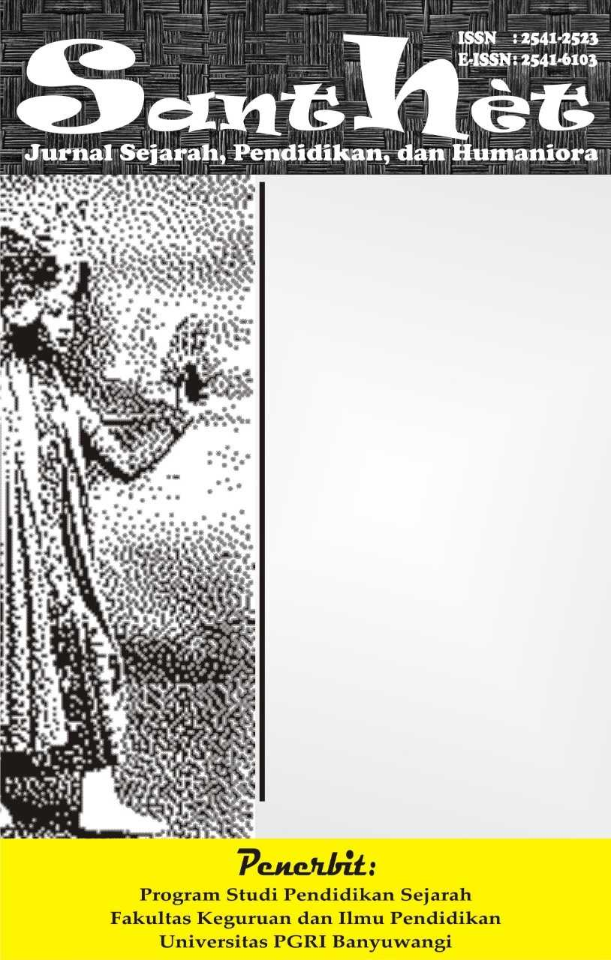Writing Anxiety: An Investigation Toward EFL Secondary Students’ in Indonesia
Kecemasan Menulis: Investigasi Terhadap Siswa Sekolah Menengah EFL di Indonesia
DOI:
https://doi.org/10.36526/santhet.v8i2.4623Keywords:
Writing Anxiety, EFL Secondary StudentsAbstract
This research investigated the issues and causes of writing anxiety among EFL secondary school students in Indonesia. There are 15 EFL secondary students in Indonesia participated in this research. The research instruments applied were a questionnaire and an interview. The data was analyzed by using four procedures: data collection, data reduction, data presentation, and conclusion. The researcher finds that the majority of anxiety of secondary students’ is cognitive anxiety. Data showed in data reduction that thirteen of the interviewees have cognitive anxiety in writing class and two more have somatic anxiety and cognitive anxiety. The factors that cause cognitive anxiety are the students' confusion, difficulty, and less interest in writing class. Students who have cognitive anxiety claim that they have difficulties in grammar and vocabulary. Then, students who also indicated somatic anxiety is caused by less confidence in their paper, have a negative perception that if they make a mistake in their paper, such as being wrong in word, phrase or paragraph arrangement. So, it can be concluded that most of the students had anxiety in writing then they need more practice to build their confidence in the writing class.
References
Blanchard, D. 2003. Native Tongues, Lost and Found: Resources and Empirical Evaluation in Native Language Identification. University of New York, NY 10065, USA.
Cahyono et al. 2017. In Indonesian EFL Students’ Perception on The Implementation of Flipped Classroom model. Journal of Language Teaching and Research. Vol. 8, No. 3, pp. 476-484.
Cheng, Y.S. 2002. Factors Associated with Foreign Language Writing Anxiety. FOREIGN LANGUAGE ANNALS * VOL. 35, NO. 5.
Chin-Lin, G. H. 2009. An Exploration into Foreign Language Writing Anxiety from Taiwanese University Students Perspectives. NCUE Fourth Annual Conference on Language, Teaching, Literature, Linguistic, Translation and Interpretation.
Ching-Ho, M. 2016. Exploring Writing Anxiety and Self-Efficacy among EFL Graduate Students In Taiwan. Canadian Center of Science and Education. Higher Education Studies; Vol. 6, no 1; 2016. ISSN 1925-4741. E-ISSN 1925-475X.
Cocuk et al. 2016. The Relationship between Writing anxiety and Writing Disposition among Secondary School Students. Eurasian Journal of Education Research, Issue 63, 2016, 335-352.
Gerring, J. 2004. What is case study and what is it good for?. American Political science Review, 98(2), 341-354.
Iwai, Y. 2011. The Effect of Metacognitive of Reading Strategies: Pedagogical Implication for EFL / ESL Teachers, The Reading Matrix, 2011: 150-159.
Marhaeni in Hasanah, K. 2011 improving the eleventh year student’ writing achievement in descriptive paragraph by using dialogues journal at MA Darul Huda Penataban Banyuwangi in the 2011/2012 academic year, unpublished thesis. Untag Banyuwangi.
Nugroho, A. A, Ena, O. T. 2021. Writing anxiety among EFL Students of John Senior High School. IDEAS Journal of Language Teaching and Learning, Linguistic and Literature. ISSN 2548-4192. Volume 9, Number 1, June 2021. Pp 245-259
Kock & Cass. 2011. Pain and Pleasure in Short Essay Writing: Factor Predicting University Students’ Writing Anxiety and Self-Efficacy. Journal of Adolescent & Adult Literacy 54(5). International Reading Association (pp. 351-360).
Tran, L. T. 2007. Learners' motivation and identity in the Vietnamese EFLWriting classroom. English teaching practice and critique. Vol. 6:1.
Widiati. 2006. The taching of EFL writing in Indonesia context: The state of the art. Jurnal Ilmu Pendidikan. 2006: 139-150 13 (03).
Xiao, Y. 2007. Applying Metacognition in EFL writing instruction in China. Reflection on English Language Teaching. 6, (1), 19-33.





























